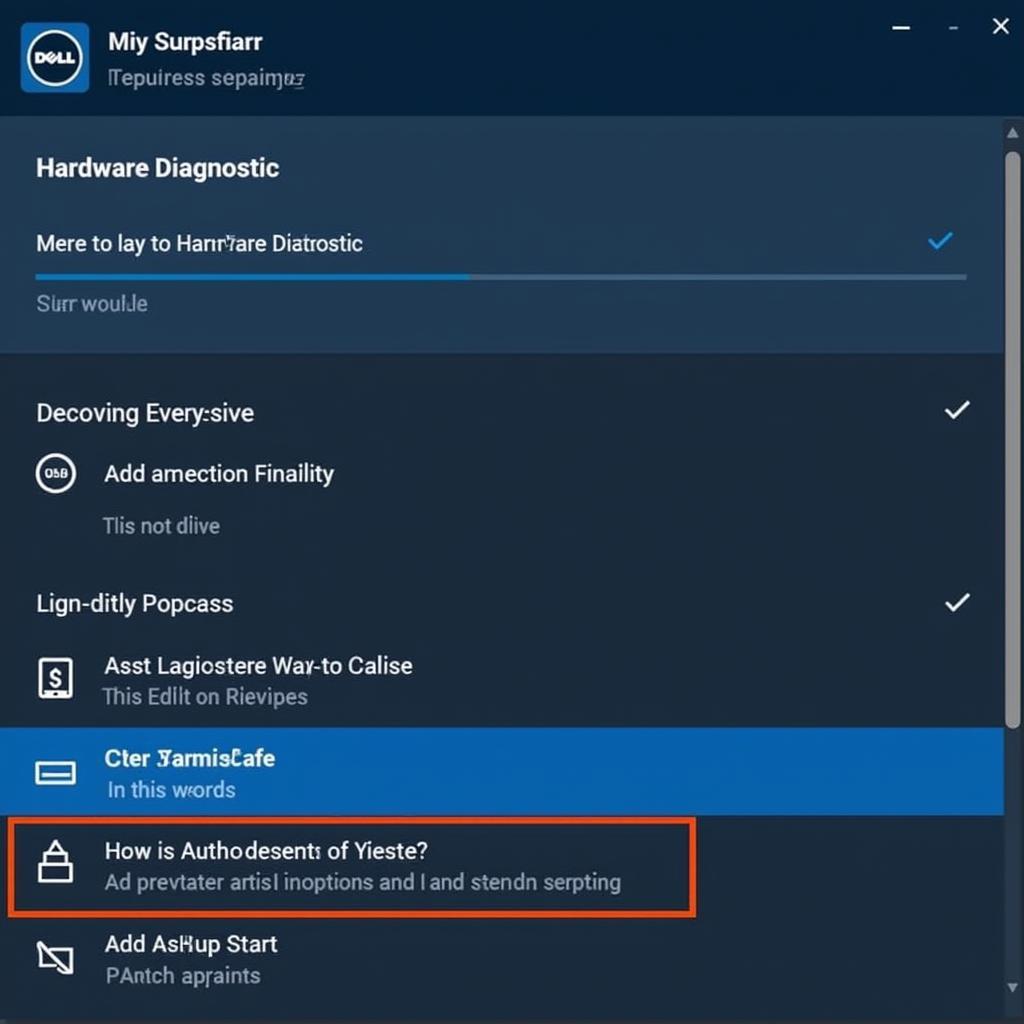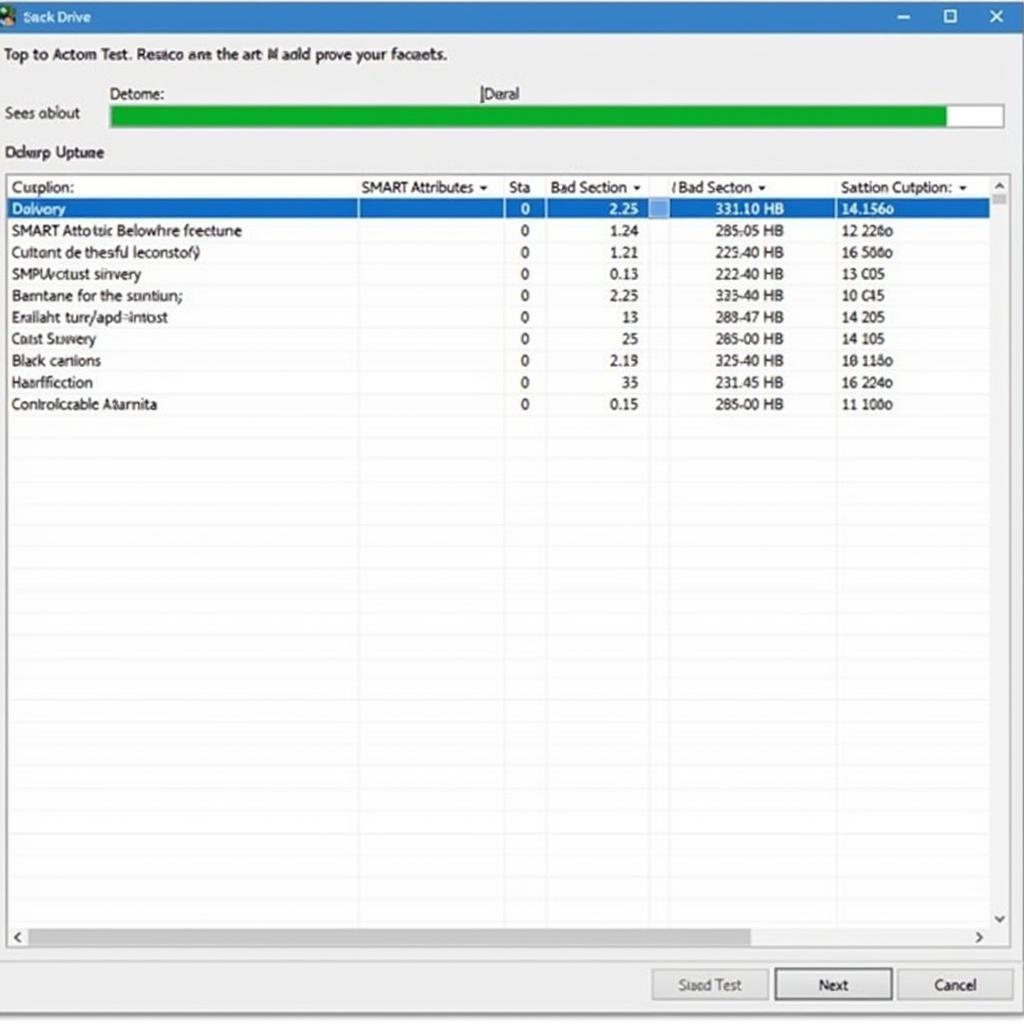Are you struggling with a failing hard drive and suspect it might be time for a replacement? Before you go through the hassle, consider using a Dell Hdd Diagnostic Tool Download to assess the situation. These powerful tools can quickly identify the root cause of your hard drive issues and help you determine the best course of action. This comprehensive guide will walk you through everything you need to know about Dell HDD diagnostic tools, from choosing the right software to interpreting the results.
Understanding the Importance of HDD Diagnostic Tools
Hard drives are complex pieces of hardware with intricate mechanical and electronic components. When something goes wrong, it can be challenging to pinpoint the exact cause without the right tools. This is where Dell HDD diagnostic tools come in handy.
These tools are designed to run comprehensive checks on your hard drive, scanning for various issues like:
- Bad sectors: These are small areas on the hard drive that can no longer store data reliably.
- File system errors: These errors can occur due to power outages, improper shutdowns, or software glitches, leading to data corruption or loss.
- Mechanical failures: Over time, the physical components of a hard drive can wear out, resulting in clicking noises, slow performance, or complete drive failure.
- Overheating: Excessive heat can significantly reduce the lifespan of a hard drive and lead to data loss. Diagnostic tools can monitor the drive’s temperature and alert you to potential overheating issues.
Choosing the Right Dell HDD Diagnostic Tool Download
Dell offers several diagnostic tool options, each with unique features and functionalities. Selecting the appropriate tool depends on your specific needs and technical expertise.
Here’s a breakdown of some popular choices:
- Dell SupportAssist: This comprehensive diagnostic and support tool comes pre-installed on most Dell computers and offers a user-friendly interface for running hardware diagnostics, including hard drive checks.
- Dell Enhanced Pre-boot System Assessment (ePSA): Accessible by pressing F12 during startup, ePSA provides a more technical approach to hardware diagnostics, allowing you to run targeted tests on your hard drive.
- Dell Diagnostic Tools ISO Image: For advanced users or those without access to pre-installed tools, downloading the Dell Diagnostic Tools ISO image offers a bootable diagnostic environment with a wide range of tests.
 Dell Diagnostic Tools
Dell Diagnostic Tools
How to Use a Dell HDD Diagnostic Tool
Using a Dell HDD diagnostic tool is generally straightforward. Here’s a general guide:
- Access the tool: Depending on the tool you choose, you can access it through the Dell SupportAssist application, by pressing F12 during startup (for ePSA), or by creating a bootable USB drive with the Dell Diagnostic Tools ISO image.
- Run the hard drive test: Look for an option specifically related to hard drive diagnostics. This might be labeled as “Hard Drive Test,” “SMART Check,” or something similar.
- Follow the on-screen instructions: The tool will guide you through the testing process, which may take some time depending on the size and speed of your hard drive.
- Interpret the results: Once the test is complete, the tool will display the results, indicating whether any issues were found.
 Hard Drive Diagnostic Results
Hard Drive Diagnostic Results
Interpreting the Results and Taking Action
Understanding the diagnostic results is crucial for taking appropriate action. Here’s what to look for:
- Pass: If the test passes without errors, your hard drive is likely in good condition.
- Warnings: Warnings often indicate potential issues that may worsen over time. Consider backing up your data and monitoring the situation closely.
- Errors: Errors indicate a problem with your hard drive that requires attention. You might need to repair the drive, replace it, or recover data from a backup.
Tips for Maintaining Hard Drive Health
- Regularly back up your data: This ensures you don’t lose important files if your hard drive fails.
- Avoid physical shocks and vibrations: Handle your laptop or computer carefully to prevent damage to the hard drive.
- Keep your system cool: Ensure adequate ventilation and avoid exposing your device to extreme temperatures.
- Run regular disk checks: Schedule periodic hard drive checks using built-in Windows tools like “Check Disk” (chkdsk).
Expert Insights
“Regular use of HDD diagnostic tools is crucial for proactive hard drive management,” says John Smith, a Senior Technician at CARW Workshop. “Early detection of potential issues allows for timely intervention, preventing data loss and extending the lifespan of your hard drive.”
Conclusion
Don’t wait until your hard drive fails to take action. Utilizing a Dell HDD diagnostic tool download can help you identify and address potential issues before they escalate into major problems. Remember to back up your data regularly and follow the tips mentioned above to maintain optimal hard drive health.
Need Help?
For professional assistance with hard drive diagnostics and repair, contact the experts at CARW Workshop.
CARW Workshop
Phone: +1 (641) 206-8880
Office: 4 Villa Wy, Shoshoni, Wyoming, United States
Frequently Asked Questions
1. Are Dell HDD diagnostic tools free to use?
Yes, most Dell HDD diagnostic tools are available for free download and use.
2. Can I use a Dell HDD diagnostic tool on a non-Dell computer?
While some tools might work, it’s generally recommended to use diagnostic tools specifically designed for your computer brand.
3. How often should I run a hard drive diagnostic test?
It’s a good practice to run a test every few months or if you suspect any issues with your hard drive.
4. What should I do if the diagnostic tool finds errors?
Back up your data immediately and consider seeking professional help for repair or data recovery options.
5. Can I fix a hard drive with bad sectors?
While some tools claim to repair bad sectors, it’s not always a guaranteed solution. Back up your data and consider replacing the hard drive to avoid future data loss.







